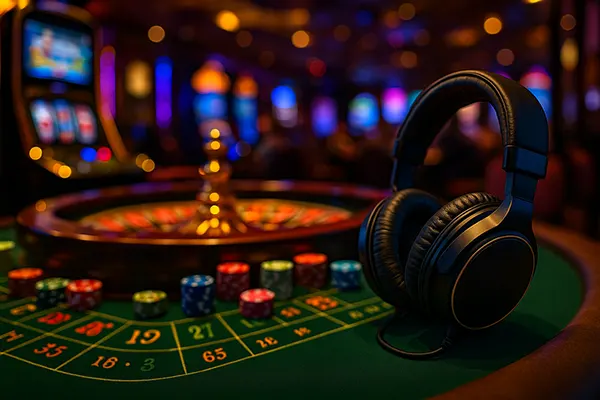
The Influence of Soundtracks on Gambling: How Music Shapes Emotions During Play
Sound is one of the most underestimated yet powerful elements in gambling environments. Every tone, rhythm, and melody is designed to guide the player’s emotions, pace, and perception of risk. In 2025, casino developers and music designers are using advanced psychological and acoustic research to create immersive sound experiences that keep players engaged and emotionally tuned in.
The Psychology Behind Casino Music
Music affects how players make decisions. Studies in behavioural psychology show that upbeat and fast-paced soundtracks encourage quicker betting and higher risk-taking, while slower rhythms promote cautious play and longer sessions. This balance is critical, as casinos aim to sustain engagement without overwhelming the player’s cognitive focus.
In physical gaming spaces, background tunes are often composed in major keys to create a feeling of optimism and reward. The effect is subtle but measurable — players tend to associate wins with positive sound cues, reinforcing the desire to continue. Meanwhile, online environments use adaptive music systems that change tempo and pitch according to in-game outcomes, enhancing the emotional journey.
Sound also supports the illusion of control. When a player hears satisfying chimes or celebratory jingles after a spin or card draw, dopamine levels rise, reinforcing the reward loop. This mechanism is similar to those observed in video game design and mobile app engagement strategies.
How Music Affects Decision-Making and Risk Perception
In modern gambling research, music is seen as a behavioural modifier. When tempo increases, players subconsciously feel more confident and energetic, leading to riskier decisions. Conversely, when melodies slow down, attention shifts towards strategy and self-control. Game designers intentionally adjust these variables to match different playing styles and moods.
For example, slot machines often feature escalating sound layers during bonus rounds. This technique builds anticipation, synchronising auditory excitement with visual stimuli. Card games, on the other hand, usually rely on neutral tones to maintain focus and reduce distraction. The subtlety of soundscapes directly influences how long a player remains active.
By 2025, artificial intelligence is being used to analyse player behaviour in real time, allowing soundtracks to evolve dynamically. These personalised audio cues aim to balance entertainment with responsible gaming principles, ensuring that emotional engagement does not cross into manipulation.
Emotional Engineering Through Sound Design
The process of designing music for gambling is closer to emotional engineering than simple composition. Every note serves a purpose — from calming background ambience to adrenaline-boosting effects after a win. Professional sound designers collaborate with psychologists to ensure that music enhances enjoyment without triggering excessive excitement or frustration.
Casinos now use binaural audio technology to simulate spatial depth and realism. This makes online gambling experiences feel more tangible, especially when paired with high-definition visuals. The result is a sensory environment where music does not just accompany gameplay but becomes part of it.
Moreover, studies show that sound can shape memory and loyalty. Players often return to a casino or game because of the familiar tunes associated with past wins. This connection between emotion and recall forms a powerful marketing tool that strengthens brand identity through sound.
Trends in Casino Soundtracks in 2025
One of the strongest trends in 2025 is the fusion of interactive music and AI-driven feedback. Instead of looping tracks, developers create evolving soundscapes that respond to user input. This approach makes every gaming session unique and more emotionally resonant.
Additionally, there is a growing emphasis on ethical sound design. Regulators in several European countries now require casinos to ensure that sound cues do not mislead players into believing they have won when the actual payout is minimal. Transparency and responsibility are becoming key standards in modern gambling entertainment.
Finally, collaborations between well-known composers and casino studios have become common. Original soundtracks by professional musicians add cultural and artistic value, elevating gambling from simple pastime to a sophisticated audiovisual experience.

Responsible Soundscapes and Player Wellbeing
While music can enhance entertainment, it must also support healthy gaming behaviour. Responsible gambling initiatives now include sound moderation policies, ensuring that audio levels and frequencies remain within psychologically safe ranges. Excessive noise or overstimulation can increase stress and impulsivity, which developers actively seek to avoid.
Some casinos integrate “calm modes,” where players can switch to minimalist soundtracks or ambient tones. These options help maintain focus and reduce the emotional highs that can lead to overspending. Accessibility features such as volume customisation and mute options are also standard in 2025 interfaces.
Music is no longer merely a background detail — it has become part of a larger conversation about user wellbeing and ethics in design. The goal is not to manipulate emotions but to create a balanced environment where entertainment coexists with responsibility.
Future of Music in Gambling Experience
Looking forward, the integration of neuroscience and machine learning will transform how casinos design their sound ecosystems. Developers are beginning to experiment with biometric feedback — adjusting music according to heart rate or stress indicators to maintain optimal emotional balance.
The evolution of virtual and augmented reality gambling will further enhance the role of music. Sound will adapt not just to the player’s actions but also to virtual surroundings, creating fully responsive environments where every note feels contextually relevant.
Ultimately, the influence of soundtracks on gambling lies in their ability to merge emotion, behaviour, and technology. By 2025, the best casinos are those that understand music not as manipulation, but as a form of intelligent design that respects both excitement and self-control.
